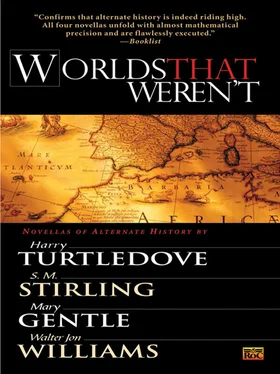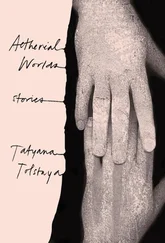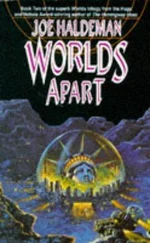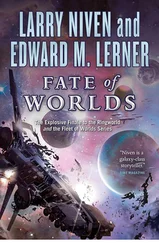Harry Williams - Worlds That Weren't
Здесь есть возможность читать онлайн «Harry Williams - Worlds That Weren't» весь текст электронной книги совершенно бесплатно (целиком полную версию без сокращений). В некоторых случаях можно слушать аудио, скачать через торрент в формате fb2 и присутствует краткое содержание. Город: New York, Год выпуска: 2002, ISBN: 2002, Издательство: Roc Hardcover, Жанр: Альтернативная история, на английском языке. Описание произведения, (предисловие) а так же отзывы посетителей доступны на портале библиотеки ЛибКат.
- Название:Worlds That Weren't
- Автор:
- Издательство:Roc Hardcover
- Жанр:
- Год:2002
- Город:New York
- ISBN:978-0451458865
- Рейтинг книги:5 / 5. Голосов: 1
-
Избранное:Добавить в избранное
- Отзывы:
-
Ваша оценка:
- 100
- 1
- 2
- 3
- 4
- 5
Worlds That Weren't: краткое содержание, описание и аннотация
Предлагаем к чтению аннотацию, описание, краткое содержание или предисловие (зависит от того, что написал сам автор книги «Worlds That Weren't»). Если вы не нашли необходимую информацию о книге — напишите в комментариях, мы постараемся отыскать её.
Worlds That Weren't — читать онлайн бесплатно полную книгу (весь текст) целиком
Ниже представлен текст книги, разбитый по страницам. Система сохранения места последней прочитанной страницы, позволяет с удобством читать онлайн бесплатно книгу «Worlds That Weren't», без необходимости каждый раз заново искать на чём Вы остановились. Поставьте закладку, и сможете в любой момент перейти на страницу, на которой закончили чтение.
Интервал:
Закладка:
Nikias muttered at the oath, which Alkibiades had picked up from Sokrates. But he had no answer. Alkibiades hadn’t thought he would.
The Peloponnesos is shaped like a hand, narrow wrist by Corinth in the northeast, thumb and three short, stubby fingers of land pointing south (the little island of Kythera lies off the easternmost finger like a detached nail). Sparta sits in the palm, not far from the base of the middle finger. Having rowed through the night, the Athenian fleet beached itself between the little towns of Abia and Pherai, in the indentation between the middle and westernmost fingers, just as dawn was breaking.
Alkibiades ran from one ship to another like a man possessed. “Move! Move! Move!” he shouted as the hoplites and peltasts and the small force of cavalry emerged from the transports. “No time to wait! No time to waste! Sparta’s only a day’s march ahead of us. If we strike hard enough and fast enough, we get there before the Spartans can pull enough men together to stop us. They’ve been ravaging Attica for years. Now it’s our turn on their home ground.”
To the east, the Taygetos Mountains sawbacked the horizon. But the pass that led to Sparta was visible even from the beach. Alkibiades vaulted onto his horse’s back, disdaining a leg up. Like any horseman, he wished there were some better way to mount and to stay on a beast’s back. But there wasn’t, or nobody had ever found one, and so, like any horseman, he made the best of things.
“Come on!” he called, trotting out ahead of the hoplites. “All of us against not all of them! How can we help but whip ’em?”
They hadn’t gone far before they came across a farmer looking up at the not yet ripe olives on his trees. He wasn’t a Spartan, of course; he was a Messenian, a helot-next thing to a slave. His eyes bugged out of his head. He took off running, and he might have beaten the man who’d won the sprint at the last games at Olympia.
“Pity we can’t cut down their olive groves, the way they’ve done to ours in Attica,” Alkibiades said to Nikias, who rode not far away.
“No time for that,” Nikias answered.
Alkibiades dipped his head. “We’ll do what we can with fire,” he said. But olives were tough. The trees soon recovered from burning alone; really harming them required long, hard axework.
The ground rose beneath the Athenians’ feet. Sweat rivered off the hoplites marching in armor. Alkibiades had made every man carry a jug full of heavily watered wine. Every so often, one of them would pause to swig. Most of the streambeds were dry at this season of the year, and would be till the rain came in winter. When the army found one with a trickle of water in it, men fell out to drink.
“They say the Persian host drank steams dry on the way to Hellas,” Alkibiades remarked. “Now we can do the same.”
“I do not care to be like the Persians in any way,” Nikias said stiffly.
“Oh, I don’t know,” Alkibiades said. “I wouldn’t mind having the Great King’s wealth. No, I wouldn’t mind that a bit. By the dog, I’d use it better than he has.”
Except for the track that led up toward the pass, the country around the Athenians got wilder and wilder. Oaks and brush gave way to dark, frowning pines. A bear lumbered across the track in front of Alkibiades. His horse snorted and tried to rear. He fought it down.
“Good hunting in these woods,” Nikias said. “Bear, as you saw. Wild boar, too, and goat and deer.”
If I’d gone back toward Athens and then fled as I first planned to do, I suppose I would have ended up in Sparta, Alkibiades thought. I would have wanted to harm Athens all I could for casting me out, and Sparta would have been the place to do it. I might have hunted through these mountains myself if I hadn’t hashed things out with Sokrates. The world would have been a different place.
He laughed. I’m still hunting through these mountains. Not bear or boar, though. Not goat or deer. I’m hunting Spartans-better game still.
No forts blocked the crown of the pass. The Spartans weren’t in the habit of defending themselves with forts. They used men instead. This time, by Zeus, some men are going to use them. Laughing, Alkibiades called, “All downhill from now on, boys.” The Athenians raised a cheer.
A hoplite near Sokrates pointed ahead. “That’s it?” he said in disbelief. “ That’s the place we’ve been fighting all these years? That miserable dump? It looks like a bunch of villages, and not rich ones, either.”
“You can’t always tell by looking,” Sokrates said. “If Sparta were to become a ruin, no one would believe how powerful the Spartans really are. They don’t go in for fancy temples or walls. This looks more like a collection of villages, as you say, not a proper polis. If Athens were to be deserted, visitors to the ruins would reckon us twice as strong as we really are. And yet, have the Spartans shown they can stand against us for the mastery of Hellas, or have they not?”
“They have,” the other hoplite replied. “Up till now.”
Now, everything in the valley of the Eurotas that would burn burned: olive groves, fields, houses, the barracks where the full Spartan citizens ate, the relative handful of shops that supported the Spartans and the perioikoi — those who lived among them, the second-class citizens on whose labor the Spartans proper depended. A great cloud of smoke rose into the heavens. Sokrates remembered seeing the smudges on the horizon that meant the Spartans were burning the cropland of Attica. Those had been as nothing next to this.
Down through the smoke spiraled the carrion birds-vultures and ravens and hooded crows and even jackdaws. They had not known a feast like this for long and long and long. Most of the dead were those who lived here. The folk of Sparta had tried to attack the Athenians whenever and wherever they could. Not just the men had come at them, but also the Spartan women, the women who were used to exercising naked like men and to throwing the javelin.
No, they’d shown no lack of courage. But the Athenians had stayed in a single compact body, and the Spartans, taken by surprise, had attacked them by ones and twos, by tens and twenties. The only way to beat a phalanx in the open field was with another phalanx. With most of their full citizens, their hoplites, not close enough to their home polis, the Spartans didn’t, couldn’t, assemble one. And they paid. Oh, how they paid.
Through the roar of the flames, an officer shouted, “We take back no prisoners. None, do you hear me? Nothing to slow us down on the march back to the fleet. If you want these Spartan women to bear half-Athenian children, do it here, do it now!”
The other hoplite said, “A woman like that, you drag her into the dirt, she’s liable to try and stab you while you’re on top.”
“I’m too old to find rape much of a sport,” Sokrates replied.
An officer called, “Come on, lend a hand on the ropes, you two! We’ve got to pull down this barracks hall before we set it afire!”
Sokrates and the other Athenian set down their shields and spears and went to haul on the ropes. The Athenians had guards standing close by, so Sokrates didn’t worry about losing his weapons. He pulled with all his might. The corner post crashed down. Half the barracks collapsed. The Athenians cheered. A man with a torch held it to a beam till the flames took hold. When they did, another cheer rose to the heavens with the smoke.
Wearily, Sokrates strode back to pick up his equipment. A little Spartan boy-he couldn’t have been more than ten-darted in like a fox to try to grab the shield and spear first. The boy had just bent to snatch them up when a peltast’s javelin caught him in the small of the back. He shrieked and fell, writhing in torment. Laughing, the peltast pulled out the throwing spear. “He’ll take a while to die,” he said.
Читать дальшеИнтервал:
Закладка:
Похожие книги на «Worlds That Weren't»
Представляем Вашему вниманию похожие книги на «Worlds That Weren't» списком для выбора. Мы отобрали схожую по названию и смыслу литературу в надежде предоставить читателям больше вариантов отыскать новые, интересные, ещё непрочитанные произведения.
Обсуждение, отзывы о книге «Worlds That Weren't» и просто собственные мнения читателей. Оставьте ваши комментарии, напишите, что Вы думаете о произведении, его смысле или главных героях. Укажите что конкретно понравилось, а что нет, и почему Вы так считаете.












